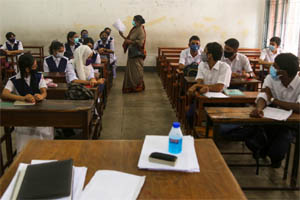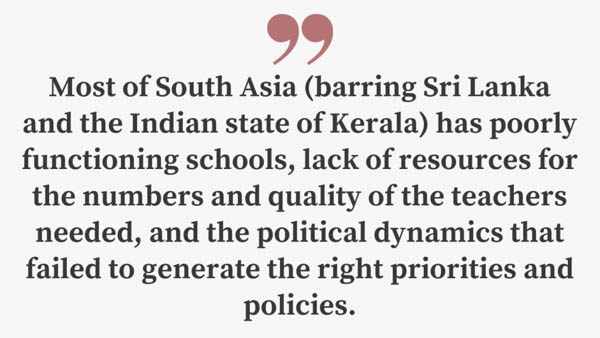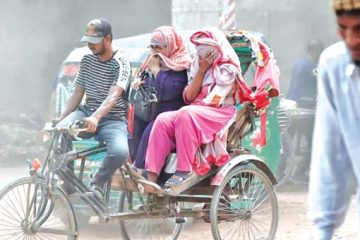Views
Manzoor Ahmed
“No system of education can be better than its teachers” is an aphorism that remains meaningful. The nostalgic and idealised image of the teacher as a scholar, dispensing knowledge and wisdom to the young selflessly, who lives a simple life with little concern for material rewards and who is looked upon by the young as a friend, philosopher and guide, is surely overdrawn. But a teacher is still the custodian of the young – manush gorar karigor. To ignore the special role of a teacher in society is to place the future of the nation at peril.
Two of my colleagues (John Richards and Shahidul Islam) and I tried to probe the causes of learning poverty in South Asia in our recent book Political Economy of Education in South Asia: Fighting Poverty, Inequality and Exclusion. Learning poverty is a concept put forward by the World Bank based on a simple metric of the proportion of 10-14-year-olds of a country who can read a simple story at Class 2 level in primary school. One might consider this to be too minimal an education goal.
Surprisingly, around 2020, the majority of adolescents, including those completing primary schooling in South Asia, could not read a Class 2 text, with the exception of Sri Lanka with 15 percent non-readers. By this criterion, the learning poverty rate was 58 percent in Bangladesh, 56 percent in India, and 77 percent in Pakistan. The comparable rate was 18 percent in China. Unesco and the World Bank estimate that the Covid-19-induced setback in education may have pushed the learning poverty rate in low-income countries from over 50 percent to around 70 percent.
We found in most of South Asia (barring Sri Lanka and the Indian state of Kerala) poorly functioning schools, lack of resources for the numbers and quality of the teachers needed, and the political dynamics that failed to generate the right priorities and policies. An example of a rare ray of light was the priority to education by the Aam Aadmi Party (AAP) in Delhi.
A report by The New York Times titled “Clean Toilets, Inspired Teachers: How India’s Capital Is Fixing Its Schools” noted that Arvind Kejriwal, the Delhi chief minister, committed billions of additional rupees to overhaul schools. His Education Minister Manish Sisodia called in top experts to design new curricula, while working with teachers, parents and students to improve classroom practices. A quarter million students moved from private to government schools and nearly 100 percent passed the school final examination in 2021, compared to 87 percent in 2012.
Bangladesh’s Education Minister Dr Dipu Moni recently wrote in the WhiteBoard magazine of the country’s “tremendous success in attaining its education goals… net primary enrolment in 2015 was nearly universal, at 98 percent, compared to 80 percent in 2000… Bangladesh has achieved what many developing countries have struggled to achieve: it has reached near gender parity. Such gains have undoubtedly allowed Bangladesh to accumulate human capital. They have made it possible to create pathways out of poverty through numeracy, literacy and skill.”
This optimistic narrative is a partial story that has to be complemented by the learning poverty narrative noted above. Measures to cope with the challenge include recruiting a large number of teachers for primary and secondary schools, which have remained on hold for over two years due to the pandemic. Forty-five thousand new assistant teachers, for whom tests and interviews have been completed, are in the process of being placed in primary schools.
At the secondary level, there are 70,000 approved teacher’s positions in non-government high schools that are vacant at this time. “Approved” means these teachers in non-government schools are eligible to be supported by government salary subsidy (through monthly pay order or MPO). We may recall that 93 percent of secondary schools in the country fall in this category. The Non-Government Teacher Registration and Certification Agency (NTRCA) plans to test and register new teachers followed by appointment of the registered teachers in schools, though a timetable is yet to be announced.
The recruitment underway or planned of the 115,000 teachers is urgently needed. When placed in schools, these teachers will barely fill the current vacuum of teachers, and they will not make a dent on the existing high student-teacher ratio in most schools.
Half of the primary-level institutions and one-third of primary students are served by the private sector – commercial “kindergartens,” English medium schools, which have sprung up even in small towns, and Qawmi madrasas, over which the government has no control. Their teaching staff is not bound by any professional regulatory standards. For the public system, while there are requirements of educational credentials and training, whether these are meaningful and effective in making a difference in teachers’ performance and students’ learning remain questionable.
To maintain a reasonable ratio of 30 students per teacher at the primary level and 15-20 at the secondary level, given the subject-wise teacher needs at this level, the number of teachers and other education personnel needs to be increased significantly, doubling in the next 10 years from the current total of about 1.5 million. But how can it be ensured that capable and well-motivated young people, who do not see it as just another job, are attracted to teaching as a profession? It is well-known that teaching at present is the last choice as an occupation. The general pattern in South Asia is that graduates of tertiary education are appointed as teachers and then they are sent for training for a
year or so, assuming that that’s all they need. The poor quality of our degree colleges (and the consequent poor subject knowledge of graduates) and the sequential approach to teacher preparation (exclusive pedagogy training after college degree) has resulted in less capable, poorly prepared, and unmotivated teachers, many of whom are not committed to the profession.
Eric Hanushek, the Stanford University economist and education researcher, and his colleagues showed from their cross-country research that student performance correlated with cognitive skills of teachers in mathematics and reading. They also found that, in some countries, cognitive skills of some teachers were lower than their best performing students – not an unlikely scenario in South Asia.
A “concurrent” approach to teacher preparation in a four-year post-secondary programme, in contrast to the prevailing “sequential” approach mentioned above, is the standard practice in most high-performing countries. A continuum of professional development from initial identification of future teachers, enrolment in professional preparation, followed by professional support, applying performance standards and appropriate incentives and enhancing teachers’ social
esteem has to be the guiding principle. India’s 2020 Education Policy envisages a four-year post-secondary preparation as the standard teacher preparation approach, with a 10-year time frame to realise this transformation.
International attention is being focused on teachers as the pivot of educational change. The Transforming Education Summit at the UN in September noted that 69 million new and better prepared teachers would be needed to achieve the SDG of quality primary and secondary education for all by 2030.
The annual Yidan Prize, the most prestigious education award in the world with the current cash value of USD 3.9 million dollars each for education research and education development, was announced on September 29. The two winners this year, Linda Darling-Hammond, professor emeritus at Stanford University, and Yongxin Zhu, professor at Soochow University in China, have both devoted their lives’ work to improving teachers’ preparation and performance. Prof Darling-Hammond has been at the forefront of research on policy and practice to ensure that all students have well-prepared teachers and inclusive classrooms. Prof Zhu founded two decades ago the New Education Initiative (NEI), which has boosted motivation and skills of over 500,000 teachers and eight million students across China.
Reimagining education workers, teachers and the teaching profession as the pivot of educational change cannot wait.
Dr Manzoor Ahmed is emeritus professor at Brac University and chair of Bangladesh Early Childhood Development Network (BEN).
– Article originally published on The Daily Star









